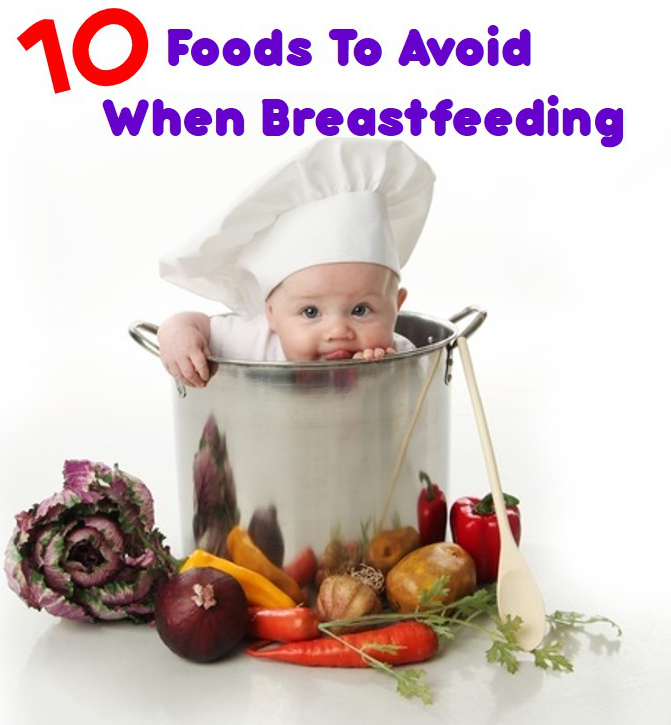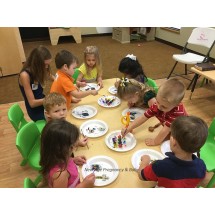
Breastfeeding may not come easy for some moms and with all that energy to feed your baby, it will be discouraging to realize that your breast milk may not be as healthy! Breast milk remains the recommended nutrition for babies up to 6 months old and continues to be the main source of nutrition up to about a year old. What the mother eats while breastfeeding does affect the quality of her breast milk, so here are the…
Top 10 foods to avoid!
1. Caffeine
Caffeine that a mom drinks may end up in her breast milk and for an infant, it is harder for the small body to excrete the caffeine. Caffeine has been linked to jitters, irregular heart beat and insomnia. Note that caffeine is not just found in coffee, but also tea, energy drinks, soda and chocolate. Limit to no more than 200mg of caffeine a day, which is about two cups of coffee.
2. Alcohol
Alcohol has been studied to affect sleep (drowsiness and weakness in the baby without proper sleep), abnormal weight gain and lower milk consumption in babies. It is best to avoid alcohol completely.
3. Pesticides
While no one seek out pesticide to consume, it is present in fruits and vegetables. Given that organic foods are more expensive, it is wise to go organic for those fruits and vegetables that have the highest amount of pesticides. Some of these are apples, strawberries, grapes, celery, peach, spinach, bell peppers, nectarines, cucumber, cherry tomatoes, potato, snap peas and blueberries (also known as the ‘dirty dozen’).
4. Mercury
Similar to pesticide, we do not look for mercury to consume but it is present in fish, a popular source of protein in Asia. Avoid fish that have higher levels of mercury such as shark, swordfish, king mackerel, solid white or albacore tuna and tilefish.
5. Raw foods
As a precaution, it may be a good idea to limit consumption of raw foods and unpasteurized dairy products as these carry a higher risk of bacterial contamination such as salmonella, E. coli and listeria.
6. Junk foods
This is to be avoided for everyone as processed foods with high sugar and sodium content have been linked to many chronic diseases. Consuming excessive junk foods may lead to consuming less nutritious foods, something which both the mother and baby needs.
7. Common Food Allergens
It is not a recommendation by pediatric association to avoid common food allergens; however, mothers who have an allergic condition tend to play safe by avoiding them. Common foods that infants are allergic to are cow’s milk, eggs, wheat, soy, shellfish and peanuts. A point to note is that the foods that the mother is allergic to does not mean that the baby will have the same food allergy.
8. Common Fussy Foods
Though not clinically proven, there are certain foods that seem to fall under the culprit of causing stomach upset and gas. Observe your baby for any such sign and see if it happens after your consumption of foods such as citrus fruits, broccoli, peppers, cabbage and Brussels sprouts.
9. Spice
This really varies from baby to baby as to which spice and how strong is palatable to a baby. If you observe that your baby does not like the milk after a spicy meal, you may want to cut down on spice including garlic.
10. Herbs
The research is not conclusive but just as certain herbs seem to increase breast milk supply, herbs like peppermint, sage and parsley have been associated with reduced milk supply.
A mother who is breastfeeding needs a well-balanced diet, adequate hydration and rest. Ask your doctor when unsure of your diet and particularly if your baby is colic, or changes in stool or rashes are observed. Apart from that, just relax!
By Mei
This article is part of Breastfeeding with Love campaign, initiated by The New Age Parents and New Age Pregnancy.
Join the Breastfeeding with Love Facebook Group to find out more and be part of our breastfeeding online community!

|
Click on the logos to find out more about our supporting partners.






